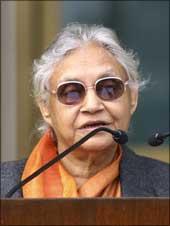 | « Back to article | Print this article |
 In this interview with Business Standard, Delhi Chief Minister Sheila Dikshit answers the question everyone is asking: 'What after the Commonwealth Games'?
In this interview with Business Standard, Delhi Chief Minister Sheila Dikshit answers the question everyone is asking: 'What after the Commonwealth Games'?
Aren't you the first chief minister to increase the price of LPG?
We haven't increased the price much. LPG became more expensive in June 2008 after the Government of India increased the price by Rs 50 a cylinder. The Delhi government then gave a subsidy of Rs 40 per cylinder.
In 2009, the central government reduced the price. We didn't touch the price then. But in view of the price hike, it was important to review the subsidy. The government has brought LPG under the zero VAT (value-added tax) regime and so the sale price will be Rs 310.38 per cylinder.
The price per cylinder is higher in other places, such as Kolkata (Rs 328.70), Gujarat (Rs 325) and Chennai (Rs 315.95).
Are you not afraid of a backlash?
No. I think people have understood. They are a little irritated; they ask: "Do we have to pay for the Commonwealth Games?" I keep telling them that the Games will last just 13 days, but their legacy will be ours. The withdrawal of VAT on CNG and LPG has made people's anger a little less.
But there is also an argument that people in Delhi can afford to pay. . .
Well, the per capita income in Delhi is Rs 88,000, the highest in India. The figure is around Rs 35,000 for the rest of the country. We have been able to take bold steps because Delhi is a trading centre, a cosmopolitan city where people from across the country come to work.
It is the only state in the country which spends 98 per cent of its Plan funds. We have achieved this in the last three years.
Then why is the Comptroller and Auditor General slamming the way your government has managed its finances?
I haven't seen the full report yet. I have only read the accounts that have appeared in newspapers. But, what is money for, if not to spend on people who live and work in Delhi? I wanted low-floor buses so that we could modernise the state's transport system. We now have buses which are air-conditioned, smart and efficient. For this, we got just Rs 50 crore (Rs 500 million) from the central government.
But I must say that because there is now more efficient collection of VAT, our revenues will keep going up.
But isn't the corpus of small savings alarmingly low? I understand you have only about Rs 200 crore (Rs 2 billion) left, as your government has been dipping into it for infrastructure creation. There is also the problem of fiscal deficit. . .
Yes, small savings are down. But VAT collections for 2009-10 are going to be Rs 1,000 crore (Rs 10 billion)
Fiscal deficit, as we all know, is the most vital piece of economic statistics, indicating the health of the economy. In order to bring it within tolerable limits, we have to slash unreasonable subsidies.
What worries me is not that we're spending money. What worries me is this: Will we have enough money for the social sector after the Games are over and infrastructure created for the event is put to use. Our state pays each widow and handicapped an allowance of Rs 1,000 each per month. Close to 250,000 people are given old-age pension amounting to Rs 1,000 per month.
We have covered 212,058 beneficiaries under the Rashtriya Swasthya Beema Yojana. Health cover to the tune of Rs 30,000 per annum per family has been given to 1.2 million beneficiaries. This covers 780 illnesses and 79 hospitals.
The government is planning to increase the uniform subsidy for students in schools run by the Municipal Corporation of Delhi from Rs 200 to Rs 500, bringing it on a par with the Delhi Government schools.
The Games will be over by the end of year. What is your vision for Delhi after that? Because you're in your third term, the ministers are doing the same job and the government is doing the same things. But for the Games, there is a sense of ennui about the government's tasks...
As I have indicated, after the Games, my biggest priority will be the social sector. We now have the Right to Education. The health of women is a big priority. I don't know if you've seen the cervical cancer campaign, but this is a big concern.
Delhi is going to have one of the biggest airports in the world in one year. It is a heritage city. New York and Washington are modern cities but they don't have the kind of history and heritage Delhi has. I want to create a capital that every Indian can feel proud of.
I'm keen to revamp the public distribution system (PDS). The pilferage in PDS shops has to be seen to be believed. I have suggested that instead of giving grain to families through PDS, we should have direct cash transfers, with the cash going to the account of the woman in the house. But there are many, including the Planning Commission, that are opposing it.
Will the coming summer be a hard one?
Well, power losses used to be 52 per cent. Now, they are 18-19 per cent.
You increased power tariffs recently...
Yes, but only for high-end and commercial users. Now, every house is metered. As for the supply, we have made arrangements to ensure that Delhi gets 3,000-4,000 Mw.
Image: Delhi Chief Minister Sheila Dixit. Photograph: Vijay Mathur/Reuters